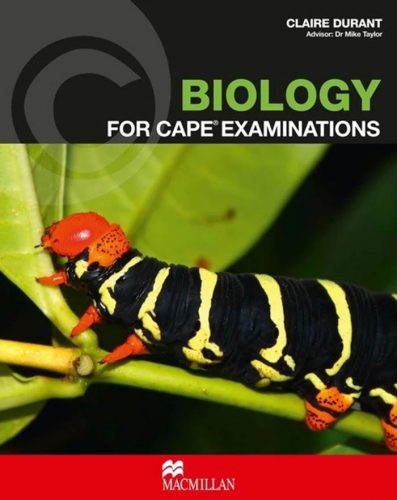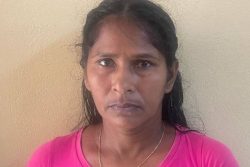As a Caribbean Examinations Council examiner for Caribbean Advanced Proficiency Examination (CAPE) biology, Dr Claire Durant recognised a disconnection between students and the subject—one which she is hoping to bridge with her new book.
Dr Durant says “BIOLOGY for CAPE Examinations” breaks down topics by taking a Caribbean perspective on the subject.
Via Zoom call, she told Sunday Stabroek that she spent a year and a half compiling information for the book, the latest Macmillan Education-Caribbean text, which takes a Caribbean outlook on biology topics for CAPE Units 1 and 2.

The former Assistant Chief Examiner for CAPE Biology has a PHD in Biology and has worked as a teacher in the Caribbean and the United Kingdom. Her passion for the subject and the reaction of students who shy away from the subject because it seems complicated are the reasons she decided to write the book. Dr Durant believes that by using familiar products and examples that are commonly known to Caribbean students, they will be able to easily understand the subject.
“As the Assistant Chief you get an opportunity to see what the children refer to when they write their answers for the questions and from that I thought it was important to write a book using all Caribbean examples and making the subject really simple so that the students… that it would encourage them to take the subject and become more proficient in it,” she explained.
She said that to the students, biology is the study of the body and plants and that seems tough to them. Her aim is to make biology relevant to everything that is done on a daily basis. As a result, the book features experiments that can be easily done with practical products and items. The breakdown makes it easier for aspects in biology to be understood by students. “You know lots of Caribbean people love to eat coleslaw for lunch and you know you have it next to food and put it in your sandwiches. Coleslaw can be used to demonstrate an easy biology topic, which is osmosis. Which is the movement of water,” Dr Durant explained.
She further explained that the side dish, made up of grated cabbages and carrots with sugar and mayonnaise, can be used to demonstrate the way that a solvent passes through a semipermeable membrane—the carrot and cabbages being the cells and the sugar being the solvent. “That is a simple demonstration of osmosis in biology that students who are accustomed to helping their mom and their parents make, you know, the little things in the kitchen. That is biology,” she said.
Dr Durant added that with the kidney, students complain that they don’t understand how it filters blood. “You can have an understanding of how your kidney works because the kidney basically makes sure blood doesn’t have too much water. You just stop, drink six glasses of water and count the amount of time it takes before you have to go the bathroom and that is your kidney working,” she further pointed out. “They say okay, all of this water enters into the stomach and now it’s in the blood and it’s just too much. That can be demonstrated in the laboratory. You can get the dialysis, you can use the instruments but what we are saying is that biology is all around you and you can learn by using simple things and because we are now in a different environment and everybody is not able to go to school so that you can have a laboratory experience, you can now use the book because the book has these,” she added.
She said the book has examples and projects that can be followed that are easier and don’t require as many lab tools but are just as effective. She described it as a practical way to do labs at home.
The book is available physically and online at the Macmillan Education-Caribbean website. She explained that the online format seemed fitting because most students are at home due to the COVID-19 pandemic. She added that Macmillan offers different ways to own the book for persons working with a budget. The site also has added tools that can help students.
While Dr Durant compiled the information and wrote the textbook during the pandemic, which required remote work, she noted that credible sourcing when using information or making reference was paramount. “I would say as working on the book and working on getting information together, it was important to concentrate to use credible sources and also to make sure that everything that is incorporated into the book Is Caribbean in nature,” she said. She mentioned that photos in the book also represent Caribbean and well known items. Animals, flowers, fruits and produce in the text book are all found in the region and she added that there is even reference to the Rupununi in Guyana to explain the topics.
Additionally, Dr Durant said that she had to put herself in the place of the students and ask whether she could understand the information after compiling it. She understood that at her level, her knowledge of the work is much more detailed than that of the student who is now familiarising him/herself. She also had to be able to apply topics such as Ecology, Biodiversity and Climate Change to everyday life or into practical things.
For Dr Durant, biology has been a subject that has brought her happiness, which she is hoping to share with students. “I am always happy when students say that they want to study it and they want to learn something and I say once you have an interest in a topic and you know that it is something that you can really master, then that is important.” She encourages that persons remember that biology students don’t have to become doctors as there are other careers that are relevant to the subject.
Macmillan and Dr Durant will also be hosting a webinar where she will further explain the book. Policymakers, educators and academics are encouraged to register for a webinar, which will be held on November 23 at 08:00 hrs and again at 16:00 hrs. She said that at the webinar she will speak on Genetics and Immunology. She choose the two topics because they can be sometimes challenging for persons to comprehend. She said that genetics involves mathematics and formulas. Immunology is a popular topic with the introduction of the COVID-19 vaccines and persons want to know how it works and affects the immune system, she said. She said she will break it down so that students can understand how it works. She reminded that the examination body always brings questions about current issues and that immunisation is among the things that are current.
The links for the webinar can be accessed here: https://macmillanic.clickmeeting.com/biology-for-cape-time-slot-1/register or https://macmillanic.clickmeeting.com/biology-for-cape-time-slot-2/register








